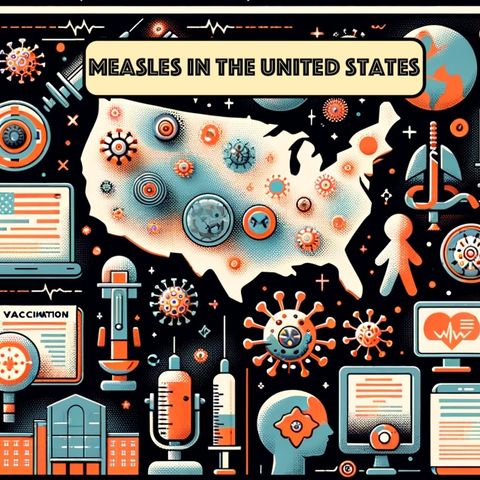Measles Outbreaks in the United States: Causes, Consequences, and Prevention Strategies

Download and listen anywhere
Download your favorite episodes and enjoy them, wherever you are! Sign up or log in now to access offline listening.
Measles Outbreaks in the United States: Causes, Consequences, and Prevention Strategies
This is an automatically generated transcript. Please note that complete accuracy is not guaranteed.
Description
Measles Outbreaks in the United States: Causes, Consequences, and Prevention Strategies Measles, a highly contagious viral disease, has made a resurgence in the United States in recent years, causing concern...
show moreMeasles, a highly contagious viral disease, has made a resurgence in the United States in recent years, causing concern among public health officials and the general population. Despite the availability of a safe and effective vaccine, the country has witnessed several outbreaks, primarily due to declining vaccination rates in certain communities.
Recent Outbreaks:
In 2019, the United States experienced its worst measles outbreak since 1992, with 1,282 confirmed cases across 31 states. New York City and the state of New York were hit particularly hard, accounting for the majority of cases. The outbreak was largely attributed to unvaccinated individuals contracting the disease while traveling abroad and spreading it to communities with low vaccination rates upon their return.
Causes of Outbreaks:
The primary reason for the recent measles outbreaks is the decline in vaccination rates. The measles, mumps, and rubella (MMR) vaccine is highly effective, with a 97% success rate after two doses. However, misinformation about vaccines, particularly the debunked claim linking the MMR vaccine to autism, has led some parents to opt out of vaccinating their children. This has resulted in pockets of unvaccinated individuals, compromising herd immunity and allowing the virus to spread rapidly.
Consequences of Measles:
Measles is not just a mild childhood illness; it can have severe complications. About 1 in 5 infected individuals require hospitalization, and 1 in 1,000 develop brain swelling (encephalitis), which can lead to brain damage or death. Measles can also cause pneumonia, hearing loss, and other serious health issues. Infants, pregnant women, and individuals with weakened immune systems are particularly vulnerable to complications.
Prevention Strategies:
Vaccination: The most effective way to prevent measles is through vaccination. The Centers for Disease Control and Prevention (CDC) recommends that children receive two doses of the MMR vaccine, with the first dose given between 12-15 months of age and the second dose between 4-6 years of age. Adults who have not been vaccinated or are unsure of their vaccination status should consult their healthcare provider.
Infection Control: If you suspect that you or someone you know has measles, it is essential to isolate the infected individual to prevent the spread of the virus. Contact your healthcare provider immediately for guidance on seeking medical attention while minimizing the risk of exposing others.
Travel Precautions: Before traveling abroad, ensure that you and your family are up-to-date on vaccinations, including the MMR vaccine. If traveling with infants too young to be vaccinated, take extra precautions to avoid exposure to the virus.
Education and Awareness: Spreading accurate information about the safety and effectiveness of vaccines is crucial in combating misinformation. Healthcare providers, public health officials, and community leaders must work together to educate the public and address concerns about vaccination.
Conclusion:
The recent measles outbreaks in the United States serve as a stark reminder of the importance of maintaining high vaccination rates to protect public health. By prioritizing vaccination, practicing effective infection control measures, taking travel precautions, and promoting education and awareness, we can work together to prevent future outbreaks and safeguard our communities from this potentially deadly disease.
Information
| Author | QP-3 |
| Organization | William Corbin |
| Website | - |
| Tags |
Copyright 2024 - Spreaker Inc. an iHeartMedia Company

Comments